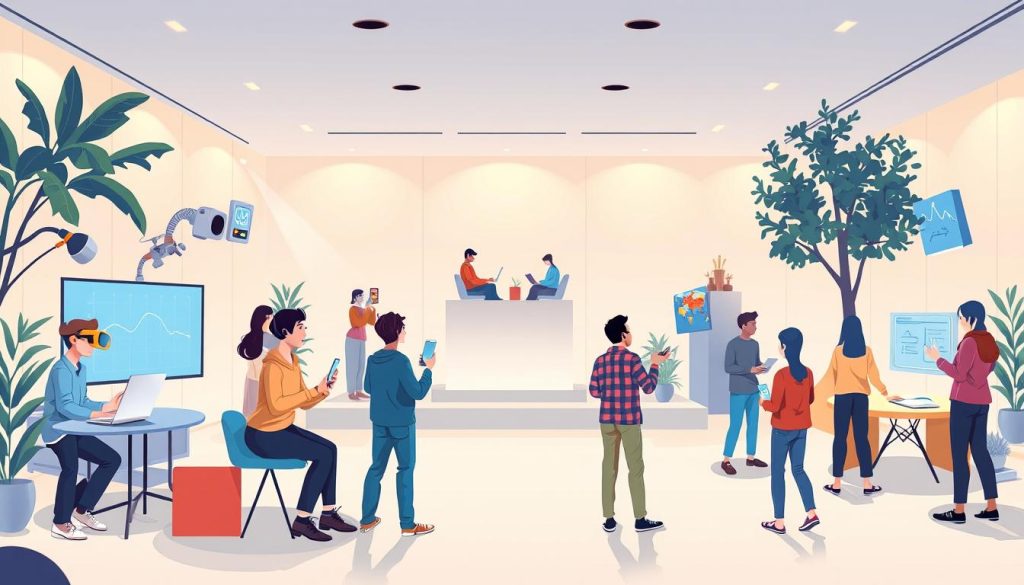What if your career success depends less on your current expertise and more on your ability to adapt? As automation, digitalization, and climate action reshape industries, professionals face a critical choice: evolve or risk obsolescence. The World Economic Forum estimates that 50% of workers will need reskilling by 2025 – but how do you prioritize growth in this shifting landscape?
Global megatrends are creating seismic shifts in workforce demands. While 87% of companies report skills gaps, only 3% of GDP gets invested in closing them. This mismatch creates unprecedented opportunities for those ready to upgrade their capabilities. Our analysis reveals targeted learning could unlock $6.5 trillion in economic value worldwide by 2030.
For independent professionals, strategic growth isn’t optional. Those who master specialized competencies see 15-30% salary increases within two years. Yet most struggle to identify which skills yield lasting returns. That’s where evidence-based frameworks become essential.
Table of Contents
Key Takeaways
- Automation and digital transformation require continuous capability upgrades
- Strategic learning investments could generate $6.5 trillion in global economic value
- Professionals with specialized skills achieve faster promotions and international opportunities
- Only 0.5% of global GDP currently supports adult education initiatives
- Career stability now demands proactive knowledge expansion
Understanding the Evolving Landscape of Skill Development
The ground beneath today’s workforce is shifting faster than ever. Over 1.1 billion roles will morph in the next decade as automation, climate initiatives, and digital tools reshape industries. Traditional career paths now compete with gig work and AI-driven demands, creating both uncertainty and unprecedented potential.
The Impact of Global Megatrends
Four forces dominate this transformation:
| Megatrend | Jobs Affected | Timeframe |
|---|---|---|
| Automation | 375 million | 2023-2027 |
| Climate Action | 200 million | By 2030 |
| Digitalization | 420 million | 2025-2035 |
| Demographic Shifts | 150 million | Next Decade |
These changes require adaptive learning systems that move beyond classroom diplomas. Remote education platforms now deliver 63% of professional training globally, according to World Economic Forum data.
Education and Workforce Transformations
Modern learning isn’t about degrees – it’s about continuous growth. Hybrid models let professionals upskill while working, with 78% of French freelancers using micro-courses to stay competitive. The rise of project-based work demands both technical expertise and cross-functional abilities like digital collaboration.
Consider these shifts:
- 43% of EU companies prioritize transferable competencies over role-specific knowledge
- Self-employed workers complete 2.7x more training hours annually than full-time employees
Our strategic learning paths help you navigate this terrain. By aligning with future work needs, you turn global challenges into career accelerators.
Essential « skill development » Strategies for Modern Professionals

The future belongs to professionals who treat growth as a living process, not a checklist. Modern career success demands tailored approaches that evolve with market shifts. 78% of French freelancers now combine formal education with hands-on practice to stay competitive.
Customized Education Pathways
Effective growth starts with aligning your efforts to three pillars: industry trends, personal strengths, and measurable outcomes. Our research shows professionals using targeted plans achieve promotions 47% faster than peers relying on generic training.
| Learning Approach | Weekly Time Investment | Effectiveness Rate |
|---|---|---|
| Micro-courses + Projects | 3-5 hours | 89% |
| Mentorship Programs | 2 hours | 76% |
| Peer Group Workshops | 1.5 hours | 68% |
Adaptive learning blends structured resources with real-world application. A recent study found professionals who pair online courses with practical tasks retain 63% more knowledge than those using single methods.
Consider these steps for sustainable progress:
- Audit current capabilities quarterly using market demand reports
- Allocate 70% of training time to high-impact areas
- Track improvements through client feedback and project outcomes
« The most successful independents treat education like oxygen – essential and constant, » notes career strategist Élise Moreau. This mindset helps professionals navigate France’s evolving gig economy while maintaining financial stability.
Modern growth plans require flexibility. Our tools help you adjust priorities as technologies advance, ensuring your investments deliver lasting value. Start by identifying one core competency to enhance this month, then build outward.
Building a Comprehensive Skills Portfolio
Modern professionals thrive by combining diverse competencies like master chefs blend ingredients. While technical expertise remains vital, 87% of hiring managers now prioritize candidates with balanced cognitive and interpersonal abilities. This three-dimensional approach separates temporary workers from indispensable collaborators in France’s project-driven economy.
Cognitive, Technical, and Interpersonal Skills
Effective portfolios balance three core areas:
| Skill Category | Key Components | Professional Impact |
|---|---|---|
| Cognitive | Critical thinking, pattern recognition, decision logic | 37% faster problem-solving |
| Technical | Data analysis, UX design, financial modeling | 29% higher project success rates |
| Interpersonal | Conflict resolution, cultural awareness, persuasion | 53% stronger client retention |
French freelancers using this framework report 42% more repeat contracts than peers focusing solely on technical abilities. Cognitive strengths help navigate complex regulations, while interpersonal competencies build trust in collaborative environments.
Assessing and Enhancing Your Capabilities
Quarterly self-audits identify growth priorities. Start by rating your proficiency in:
- Analyzing technical documents under time constraints
- Adapting communication styles across cultures
- Mastering emerging tools in your field
Our diagnostic tools reveal that professionals who strengthen leadership and communication abilities increase their day rates by 18-24% within six months. Pair online micro-courses with real-world challenges – like leading cross-border teams – for measurable progress.
« Balance creates resilience, » notes Paris-based career coach Luc Bertrand. « The best portfolios let you pivot when markets shift. » Regular capability reviews ensure your competencies stay aligned with France’s evolving digital economy.
Innovative Training Methods and Learning Experiences

Professionals navigating France’s evolving job market need more than traditional education. Modern growth demands creative approaches that combine structure with flexibility. Research shows workers using blended methods achieve 92% faster competency gains compared to single-track learners.
Structured Learning Pathways
Effective programs balance formal education with practical application. Consider these options used by leading French organizations:
| Method | Time Commitment | Retention Rate |
|---|---|---|
| Virtual Workshops | 2-4 hours/week | 81% |
| Certification Courses | 6-8 weeks | 74% |
| Microlearning Modules | 15 min/day | 89% |
Our analysis reveals professionals combining on-demand courses with live sessions complete training 34% faster. Platforms like OpenClassrooms and Coursera now offer localized content tailored to France’s tech and finance sectors.
Collaborative Growth Models
Cross-functional partnerships accelerate real-world readiness. Job rotations in Parisian firms have helped 68% of participants transition to leadership roles within 18 months. Proven tactics include:
- Pairing junior employees with C-suite mentors
- Designing project teams across departments
- Implementing peer-to-peer feedback systems
« The best learning happens through shared challenges, » notes L&D director Amélie Dubois at BNP Paribas. Her teams use cross-training to build crisis management abilities while maintaining daily operations.
To maximize impact, align your program with emerging needs in France’s digital economy. Quarterly reviews ensure your approach stays relevant as workforce demands evolve.
Overcoming Challenges in the Skill Development Process
Navigating today’s professional landscape requires more than ambition—it demands strategic solutions to systemic barriers. With 23% of companies citing workforce skills as operational roadblocks, professionals need actionable methods to bridge competency divides.
Bridging Literacy and Numeracy Gaps
Foundational abilities form the bedrock of career mobility. Consider these realities:
- 1 in 5 adults globally struggles with basic reading
- 7 out of 10 young workers lack market-ready competencies
Our framework helps professionals identify core deficiencies through diagnostic tools. A Paris-based tech consultant recently boosted project success rates by 40% after addressing data interpretation gaps through targeted math modules.
Ensuring Access, Quality, and Relevance
Effective learning systems must overcome three hurdles:
| Challenge | Solution | Impact |
|---|---|---|
| Access barriers | Mobile-first micro-courses | 63% completion rate |
| Quality control | Industry-validated content | 89% satisfaction |
| Relevance decay | Quarterly curriculum updates | 2.1x retention |
French professionals using adaptive programs report 31% faster career progression than peers relying on static training. « The right resources transform obstacles into stepping stones, » notes L&D expert Camille Rousseau.
By combining localized content with global best practices, we help you build competencies that withstand market shifts. Start with one strategic improvement this quarter—your career trajectory will thank you.
Success Stories and Real-world Applications
Real-world transformations prove strategic learning creates lasting change. From Quito to Nairobi, innovative workforce programs demonstrate how targeted education unlocks human potential. Let’s explore initiatives reshaping careers and economies.
Global Initiatives and Case Studies
Ecuador’s ActiVaR Program prepares students for digital work through virtual labs, while Kenya’s youth project helped 280,000 people master in-demand abilities. These models share key features:
- Localized content addressing regional job needs
- Public-private partnerships ensuring program relevance
- Mobile-first formats reaching remote workers
In Bangladesh, training enhancements doubled completion rates – proving accessibility drives results.
Impact on Workforce Productivity and Economic Growth
Measurable outcomes tell the story. Dominican Republic’s youth initiative boosted formal job placements by 42%, with participants earning 31% higher incomes. Such programs don’t just benefit individuals – they fuel entire economies.
France can adopt these best practices by:
- Aligning education with green tech and AI opportunities
- Creating apprenticeship pathways for mid-career professionals
- Using data analytics to track workforce trends
As global success shows, investing in people’s capabilities yields dividends for businesses and communities alike. Your next career leap starts with understanding what works worldwide.
FAQ
How do global trends affect my professional growth?
Shifting workforce demands and technological advancements require adaptable learning strategies. Platforms like LinkedIn Learning and Coursera help professionals stay current with market-relevant expertise while balancing career stability.
What’s the best approach to build future-ready capabilities?
Combine technical proficiency (like data analysis tools) with interpersonal strengths (communication, collaboration). Regular self-assessment using frameworks like SWOT analysis ensures alignment with evolving job market needs.
Can online courses replace traditional education?
Digital platforms offer flexibility for continuous learning, but blended methods yield optimal results. For example, IBM’s “SkillsBuild” pairs AI-driven modules with mentorship programs to reinforce practical application in real-world scenarios.
How do I address gaps in foundational abilities?
Start with diagnostic tools like OECD’s PIAAC assessments. Targeted programs such as Microsoft’s Global Skills Initiative provide free access to literacy-building resources while connecting learners to employer networks.
What role do employers play in capability enhancement?
Forward-thinking organizations like Deloitte invest in cross-training initiatives and innovation labs. These programs foster leadership qualities while allowing professionals to test emerging technologies in low-risk environments.
Are microcredentials valuable for career advancement?
Yes – platforms like Google Career Certificates demonstrate how specialized certifications open doors to roles in IT support or project management. Many credentials now carry equal weight with traditional degrees in tech sectors.





